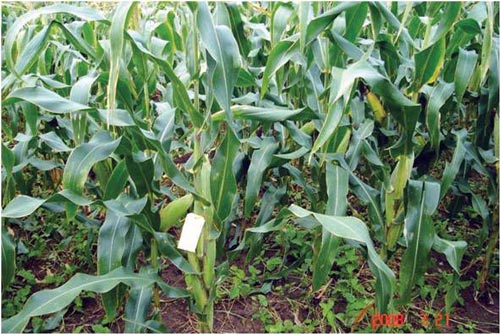 The Insect Resistant Maize for Africa (IRMA) project recorded a tremendous success in 2010 with the release of six maize varieties. The released varieties are hybrids that have post-harvest and stem borer resistance, which means they are not susceptible to damage by pests such as the maize weevil and the larger grain borer (LGB). Under the IRMA project, CIMMYT, working alongside the Kenya Agricultural Research Institute (KARI), submitted 12 maize hybrids to the Kenya National Performance Trials (NPT) for testing during 2008-2010.
The Insect Resistant Maize for Africa (IRMA) project recorded a tremendous success in 2010 with the release of six maize varieties. The released varieties are hybrids that have post-harvest and stem borer resistance, which means they are not susceptible to damage by pests such as the maize weevil and the larger grain borer (LGB). Under the IRMA project, CIMMYT, working alongside the Kenya Agricultural Research Institute (KARI), submitted 12 maize hybrids to the Kenya National Performance Trials (NPT) for testing during 2008-2010.
The Kenya Plant Health Inspectorate Services (KEPHIS) and the National Performance Trial Committee (NPTC) oversee the release of varieties in Kenya. The variety release process begins when a variety is nominated for testing. Soon after, seed samples are submitted for testing in at least five locations in the target agro-ecological zones. The insect pest-resistant varieties were subjected to the pests, but the release was also based on yield superiority. Typically, less than 5% of samples submitted are released after two to three years of testing. It is a huge accomplishment that the IRMA project’s hybrids were rapidly accepted, taking only two years for approval and release.
The maize hybrids were tested in three agro-ecological zones; coastal lowlands, dry lowland, and medium altitude zones. The successful varieties are MTPEH0701, MTPEH0702, and MTPEH0702 for the humid coastal lowlands ecology; EMB 0701 and EMB 0701 for the medium maturity mid-altitude ecology; and KATEH 2007-3 for the dry mid-altitude areas of Kenya. MTPEH0701, MTPEH0702, and EMB 0701 are post-harvest pest resistant (maize weevil and LGB) varieties, while MTPEH 0703, KATEH 2007-3, and EMB 0703 are stem borer resistant varieties. The hybrids are medium and early lowlands varieties, suitable for the Embu Katumani and Mtwapa regions in Kenya. These varieties join the nine already existing varieties that IRMA/KARI released in 2006-2007.
The nominations of the varieties were done by CIMMYT’s partners from KARI; Charles Mutinda (KARI, Embu), James Gethi (KARI, Katumani), and Ruth Musila (KARI, Mtwapa). In Kenya, KARI has begun producing breeders’ seed for the new varieties which are currently being tested in eight other IRMA-participating countries, with hopes of eventually releasing them there as well.
 Capacity development
Capacity development